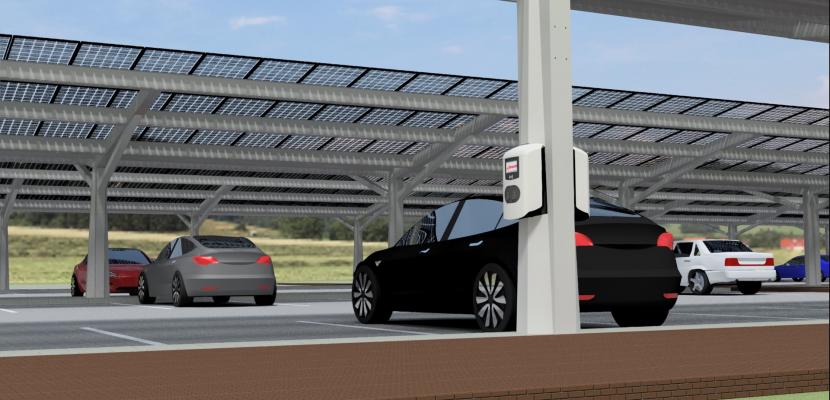Image

PowerParking
Published on 22 January 2018

Netherlands
Flevoland
This is the good practice's implementation level. It can be national, regional or local.
About this good practice
PowerParking is an innovative pilot project to transform (large) parkings to decentralised sustainable energy plants. It provides a solution to the increasing imbalances on the grid and the need for a more flexible energy system.
The public carpark in the centre of Dronten municipality has been partly covered by a carport with solar panels. The solar energy is being used to charge electric vehicles and for the town hall. A surplus of energy can be stored temporarily in a battery. The Nilar battery we’ve chosen is more sustainable and there is less fire hazard.
A smart ICT system decides on where the energy is going. Part of the project is to further develop the business case, so the concept can be built without subsidies in the future.
The PowerParking, combined with vehicle to grid (V2G) is being tested on small scale at the Green Village of Delft Technical University. TU Delft has published several research results on: public acceptance of V2G, price optimized charging, behind the meter storage, etc. The papers are available on demand.
Provincie Flevoland has developed the project together with LA, LAB, municipality of Dronten, Delft Technical University, Pontis Engineering (SME engineering of composite constructions), Eneco (DSO) en Alfen (SME in electric engineering and construction). Peta Watts is managing the energy flows and the battery.
The public carpark in the centre of Dronten municipality has been partly covered by a carport with solar panels. The solar energy is being used to charge electric vehicles and for the town hall. A surplus of energy can be stored temporarily in a battery. The Nilar battery we’ve chosen is more sustainable and there is less fire hazard.
A smart ICT system decides on where the energy is going. Part of the project is to further develop the business case, so the concept can be built without subsidies in the future.
The PowerParking, combined with vehicle to grid (V2G) is being tested on small scale at the Green Village of Delft Technical University. TU Delft has published several research results on: public acceptance of V2G, price optimized charging, behind the meter storage, etc. The papers are available on demand.
Provincie Flevoland has developed the project together with LA, LAB, municipality of Dronten, Delft Technical University, Pontis Engineering (SME engineering of composite constructions), Eneco (DSO) en Alfen (SME in electric engineering and construction). Peta Watts is managing the energy flows and the battery.
Expert opinion
This practice is a very interesting pilot project, which could provide proof of concept of a small scale, decentralised smart grid system and demonstrate its potential to regions across Europe. The true transferability of the practice cannot be known until the pilot is complete, but there are clearly interesting lessons to be learnt from the experience, and hopefully developments such as the smart ICT system could be commercialised for use by other regions. Lessons on suitable business models for achieving a subsidy-free project will be worth watching out for.
Works at
Interreg Europe Policy Learning Platform
Resources needed
PowerParking receives € 1,2 M from the ERDF programme and € 0,5 M co-financing from the Province of Flevoland. The rest of the investments (in total € 3,1 M) come from the project partners.
These costs include the cost of human resources.
These costs include the cost of human resources.
Evidence of success
The constructions are finished in March 2021. TU Delft will monitor the system in Dronten for one more year (until March 2022) and then write an evaluation.
We have received additional funding from ERDF to develop two more test locations in Flevoland (in the towns of Lelystad and Almere).
We have received additional funding from ERDF to develop two more test locations in Flevoland (in the towns of Lelystad and Almere).
Potential for learning or transfer
The project contributes to solving grid issues. There is hardly any societal resistance to solar carports, since it is a double use of scarce space. The challenge remains to make PowerParking economically viable without subsidy. From then, the potential of transfer is very large, since every country has large car parks, which can be transferred. Even if the number of electric cars is not very large yet, the PowerParking can deliver energy to the environment. Since car parks are normally situated in an environment where much energy is needed.
Good practice owner
You can contact the good practice owner below for more detailed information.
Organisation
Province of Flevoland

Netherlands
Flevoland
Contact
Project manager
